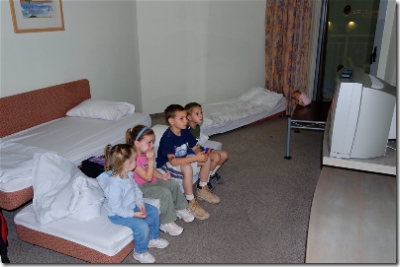I think that probably most of my readers more often get the Israeli perspective than the Arab one. Today I read an article about the travels of one Arab professor who frequently flies in and out of Israel. I think it’s worth reading to get a feel for the difficulties of life on the other side.
Our Trip to the Negev
Our family recently returned from a 4-day trip to the Negev. I was teaching and thought that they would be intrigued with the transitory patterns of migrating Bedouin in the biblical period. This has been a three-year tradition. Nine years ago, I went on the trip with the school cellphone at the ready (back then, cellphones weren’t as ubiquitous) in case Kelli called on the way to the hospital. The trip was uninterrupted and Luke was born a few days later. Three years later, Kelli, Luke and Mark all came along for the trip. Luke walked up Masada with help from our friend Becky. Three years after that, a very-pregnant Kelli was along together with Luke, Mark and Bethany. This time, Luke (age 6) walked up Masada by himself. Well, not all alone, but without assistance. Last week, we reprised the trip with a nearly-three-year-old Katie in tow. Luke and Mark joined me on the walk up Masada and both hardly needed to take a break at all.
Three years ago, we stayed in at a nice hotel in Eilat. One of the boys was thrilled with the room and exclaimed, “look, mom, a computer.” And spotting another in the bedroom, “two computers!” They were unfamiliar with a small object with a large gravitational pull known to the rest of the world as a television.
This year, the object was less of a mystery, but when Luke needed to go to the bathroom, he insisted that it be paused.
I suppose I should expect to be called in by Social Services to answer charges of how we are depriving our children of a normal upbringing. Though I should add, that it’s not purely principle, but also a matter of space in the house.
Proposed Law to Ban Missionary Activity
This is not the first attempt and probably won’t be the last. But I think it worth reading anyway. From Arutz-7:
A record number of Jews converting to Islam last year prompted the Shas Knesset faction Tuesday to propose a bill that would jail missionaries who proselytize to individuals in Israel….
The existing law mandates six months ‘ imprisonment for those who attempt to persuade Israeli minors to leave their faith or who perform a conversion ceremony on the children and teens.
The current legislation also imposes a five-year jail term and/or a fine on anyone who offers money or other goods to persuade an individual under age 18 to convert to another faith.
It does not, however, outlaw missionizing towards adults, a deficiency that would be corrected by the new law.
Some 70 Jews left the faith of their fathers to join the Muslim community, up from 33 converts to Islam in 2005 and 27 such conversions in 2004. The number of Muslims who convert to Judaism was dramatically lower, with only 7 conversions registered with the government by July 2006.
Many of the Jews who converted to Islam were women who married Arab men, a process made considerably easier than conversion to Judaism because it involves only a declaration of faith in Allah.
The numbers have been even higher in conversions to Christianity. Statistics reported by the Interior Ministry indicated that 437 Jews abandoned their faith to “accept Jesus” in 2003, rising to 884 converts to Christianity in 2004 and 733 in 2005….
“We do not mean to violate freedom of religion, or freedom from religion,” said a source in the Shas party quoted by the Ynet news service. “We mean to allow everyone to believe in their own religion and prevent harassment by any source trying to harm the basic democratic right according to which ‘every man may live in his religion. ‘” Such activity is also forbidden by Jewish law, note rabbinical scholars.
“Whether it is Christians coming from abroad or Jewish converts working in Israel, they all have the same agenda – to destroy every trace and memory of the people of Israel,” reads the proposed bill.
Monday night
As we leave for the Negev…
I am again so impressed with the thinking of this young man…
A former IBEXer, Cindy (Burnham) Waldeck (S97) and husband Dan have lost their 7-year-old daughter. Pray for them. These must be very hard days, no matter what.
Our whole family is going on a four-day trip with the students to the Negev. It’s become a three-year tradition. Luke just turned 9; the last time he went, he climbed Masada.
The Olde Self-Timer
Andrea's brother
My students are very dear to me. This may not be evident from my cold and cruel exterior, but it is deeply true and it extends far beyond their time in my classroom. Even those that I taught 10 years ago, I still feel a bond with them and remember them in many cases as if they were here yesterday. I know that the feeling may not be mutual, but that does not change how I feel.
A former student wrote to me today. Andrea was here 7 years ago and she was quite a bubbly and fun student who served as a dorm leader. I don’t have favorites, but if I did, she was one of them. She later married another beloved former IBEXer who was here some years earlier.
Her brother, Erik Greene, is in a coma now. His kidneys have shut down and there are tumors on his brain. Much is still a mystery, but yesterday they inserted a feeding tube and tomorrow they will do a semi-permanent tracheotomy. Doctors think his childhood leukemia may have returned. If the Lord preserves Erik, it looks like it will be a long hard battle.
Erik is 35 and has 4 children. I know exactly how that feels. Though you don’t know him or his family, perhaps you could pray for them today.
James 5:16 “The prayer of a righteous man is powerful and effective.”
UPDATE (3/11): You can keep up with God’s answers to prayers for Erik here. I don’t see an RSS feed for the site.
Free books and free wallpaper photos
If I can’t give you something good, I can give you something free. Actually, I’m giving you nothing, but I did find some good things that are free.
John Piper’s God is the Gospel is available for free in pdf format. I bought the book already, but Piper writes faster than I can read and I am haven’t gotten to it yet.
And about a month ago, three works in one, Overcoming Sin and Temptation, was made available for free in pdf format. The foreword itself is fantastic. And the book easily looks worth buying and marking up.
Some beautiful photos designed for Windows Vista wallpapers but that didn’t make the cut can be downloaded for free. Some stunning shots. And since they’re just jpg files, they’ll work on any computer, including one that is named after a fruit!.
Tomorrow I’ll spend the day standing on the tops of various piles of dirt in the Shephelah.
Good Times…
Sabbatical Year in Modern Israel
If modern Jewish approaches to the observance of the “sabbatical year” are of interest to you, today’s article in Arutz-7 is worth reading. Instead of giving the land a rest, a lot of work is done to figure out how to obey the letter of the law, but not its spirit.
Leviticus 25:1-7 (NIV) ” The LORD said to Moses on Mount Sinai, “Speak to the Israelites and say to them: ‘When you enter the land I am going to give you, the land itself must observe a sabbath to the LORD. For six years sow your fields, and for six years prune your vineyards and gather their crops. But in the seventh year the land is to have a sabbath of rest, a sabbath to the LORD. Do not sow your fields or prune your vineyards. Do not reap what grows of itself or harvest the grapes of your untended vines. The land is to have a year of rest. Whatever the land yields during the sabbath year will be food for you—for yourself, your manservant and maidservant, and the hired worker and temporary resident who live among you, as well as for your livestock and the wild animals in your land. Whatever the land produces may be eaten.”
And the first few paragraphs from the article:
The upcoming Shemittah year – in which Biblical law mandates that the Land of Israel lie fallow and its Jewish-grown fruits, of special Shemittah sanctity, be free for all to eat – presents major challenges for Israel’s economy.
Slamming down the brakes on Israel’s agricultural enterprise for an entire year is all but impossible, for several reasons. Chief among them is the fact that many Israeli farmers are not religiously observant and have little interest in adhering to the Shemittah laws. In addition, dropping out of the export markets for a year causes not only short-term difficulties, but losses in future years as well; for once a market is lost, it is very hard to regain.
This issue has occupied leading rabbis and agriculturalists ever since the modern national revival of the Jewish People in the Land of Israel began a century and a half ago. Two approaches have traditionally been implemented. One is the Heter Mechirah, which is a temporary sale of the land to non-Jews, thus exempting it from the Shemittah laws. This approach was generally accepted only by the religious-Zionist public, while the non-religious farmers went along with it as well. It was meant only as a temporary measure, but has become institutionalized, to the dismany of many.
Here’s a good word:
Hebrews 4:9-11 (NIV) “There remains, then, a Sabbath-rest for the people of God; for anyone who enters God’s rest also rests from his own work, just as God did from his. Let us, therefore, make every effort to enter that rest, so that no one will fall by following their example of disobedience.”
The End of the Israeli Kibbutz
If all you know about modern Israel comes fun historical novels like Leon Uris’ Exodus, then you may not be aware that the kibbutz movement has died. This didn’t happen overnight, but the recent overwhelming vote of the first kibbutz in Israel to dissolve the cooperative nature of their community might be viewed as the singing of the fat lady. Kibbutzim are based on a philosophy elsewhere known as communism. This failed in eastern Europe and Russia and it has failed here as well. There’s a fundamental problem with a system that depends upon the goodness of people to perform rather than upon an incentive approach. Ever since the fall, man has understood a basic point: if you work, you eat. If you work harder, you eat more. This isn’t true in every situation, but in general, the principle holds. Kibbutzim denied this principle with the philosophy that everyone eats the same amount regardless of how hard or how well they work. There were some unique realities that made the kibbutz approach work for a while, but that time has past. Now kibbutzniks are fed up with those who eat and don’t work.
Anyway, I didn’t plan to do more than to suggest that those interested in the demise of the kibbutz read this interesting article in Haaretz. The community where I live (as a renter, not a member) is currently in the midst of privatizing as well.




